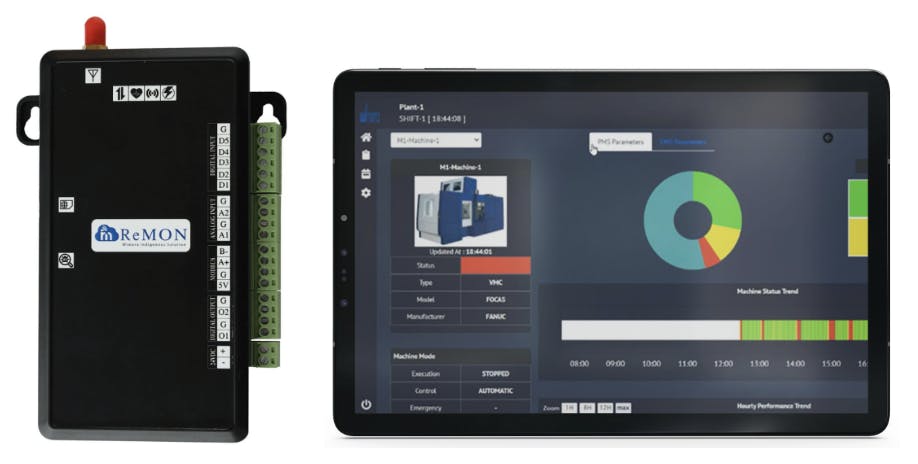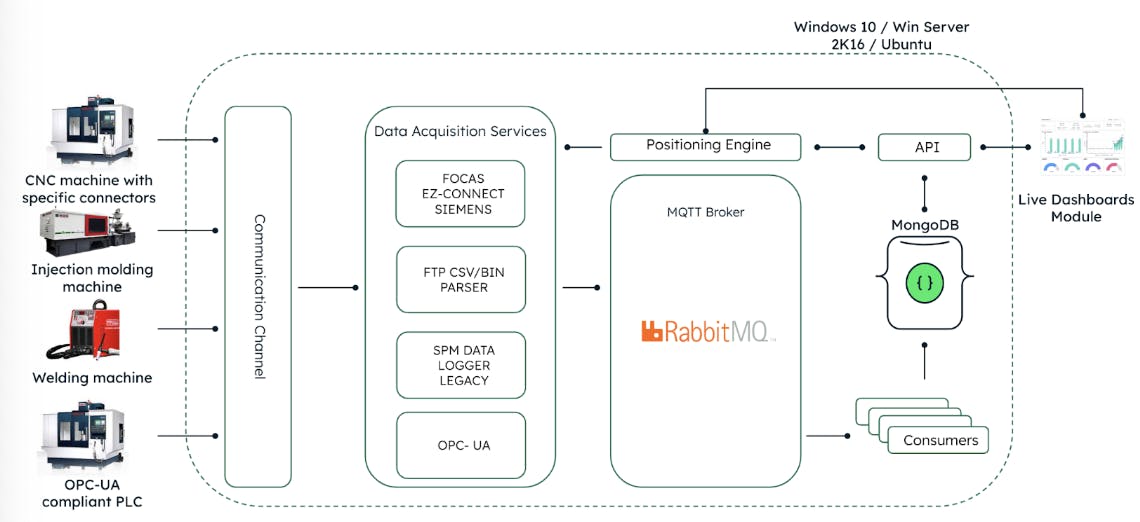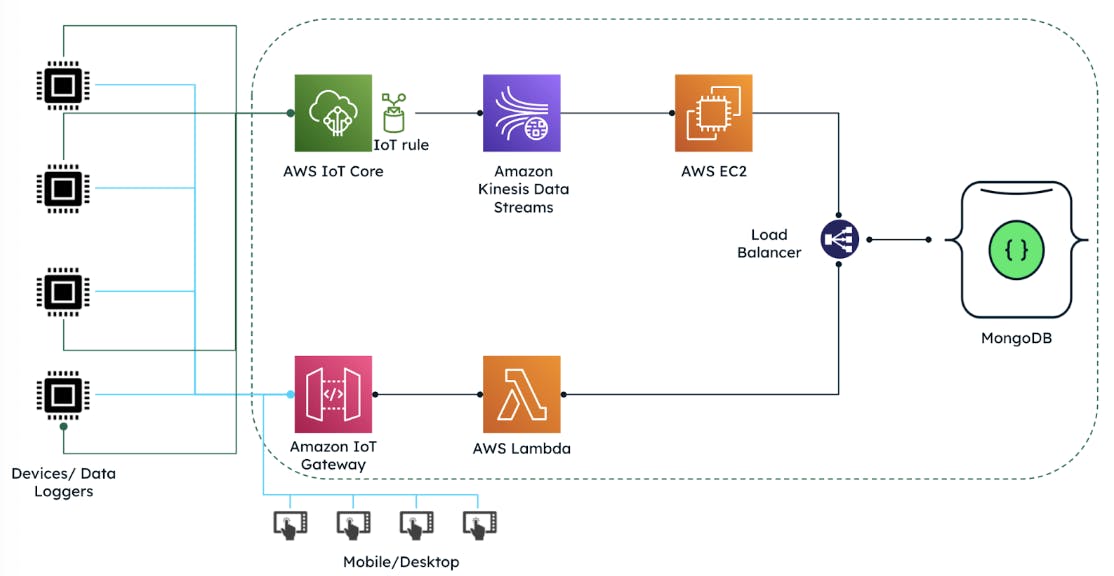Achieving Industrial Connectivity at Scale with Wimera and MongoDB
December 1, 2022 | Updated: July 15, 2025
Industry 4.0 (I4.0) represents the beginning of the Fourth Industrial Revolution. It includes the current trend of automation technologies in the manufacturing industry as well as disruptive technologies and concepts, such as cyber-physical systems (CPS), Industrial Internet of Things (IIoT), cloud computing, and immersive visualization.
Through Industry 4.0, embedded systems, semantic machine-to-machine communication, IIoT, and CPS technologies are integrating the virtual space with the physical world. These technologies are enabling a new generation of industrial systems, such as smart factories, to deal with the complexity of fast-paced and hyper-personalized production.
In this article, we’ll explore Wimera’s unique solutions to the challenges of I4.0 and IIoT, built with MongoDB.
Information and insights
With IIoT, existing industrial systems will be modernized to drive digital transformation and unlock tomorrow's smart enterprise. IIoT has been finding its way into products and sensors while revolutionizing existing manufacturing systems; thus, it is considered a key enabler for the next generation of advanced manufacturing.
Industry 4.0 generally comprises many complex components and has broad applications in all manufacturing sectors. The first challenge faced by manufacturing companies when embarking on the I4.0 journey is to sensorize and connect their manufacturing equipment in order to collect, store, and analyze data for information and insights.
Wimera Systems is solving this challenge as an I4.0 enablement company offering IIoT solutions using their unique hardware, software application, and AI/ML-based analytics engine. Wimera’s Smart Factory Suite has seen tremendous growth, with 2500+ global installations across 50+ customers.
MongoDB has been pivotal to that growth, acting as the core component of the IIoT suite and enabling the company to offer its services at scale without having to worry about managing the complexity of an IIoT database.
Bringing AI-powered IIoT to the manufacturing shop floor
Manufacturing companies are emerging from the pandemic with a renewed focus on digital transformation and smart factories investment. COVID-19 has heightened the need for IIoT technology and innovation, forcing manufacturers to compete in a digitalized business environment.
Many manufacturers still operate using legacy technologies and systems; on most shop floors, equipment and operator efficiency are manually calculated and tracked using spreadsheets. The machines are maintained using time-based rather than condition-based maintenance strategies. And, no real-time visibility exists on consumables and tools usage. All these practices result in increased maintenance costs, suboptimal production, and ultimately, customer dissatisfaction.
Wimera understands these challenges all too well, which is why they created the Smart Factory Suite supporting both on-premise and cloud deployments.
The Smart Factory Suite provides insights for managing the entire production landscape through interconnected devices and machines, operations, and facilities. It can predict and make real-time adjustments for increased production efficiency and less downtime. The suite is primarily utilized for empowering manufacturing operations, equipment maintenance, warehouse operations, and inventory management. With Smart Factory Suite, Wimera serves a wide range of manufacturing industry sectors including, but not limited to, automotive, electronics, chemical, and food processing companies.
Deploy and run anywhere with MongoDB
MongoDB, with its freedom to run anywhere, lets Wimera offer both on-premises and cloud deployment options for its customers. In both cases, the suite is directly connected with machine controllers using Wimera libraries for all popular Programmable Logic Controller (PLC) brands. The suite is also connected to legacy machines through external sensors installed by the Wimera team.
Data is extracted via the Wimera ReMON Data Acquisition (DAQ) device (Figure 1) that utilizes the MongoDB database as the persistent data storage. MongoDB’s flexible data model makes it easy to combine and enrich this data and enables live dashboards and instant alerts for factory personnel. The data collected and optimized by ReMON DAQ is further fed to ReMON AI, an advanced analytics engine. ReMON AI provides advanced analytics through AI/ML models and leverages MongoDB to deliver application-driven analytics in real time.

Whether through on-premises or cloud deployment (Figures 2 and 3), Wimera’s customers have benefited from MongoDB’s capabilities that are critical for IIoT applications, such as time series collections and the flexible, intuitive document data model.


In one customer example, while deploying IIoT at a multinational CNC machine shop, the customer preferred to use their existing production monitoring application enriched with IoT data coming from Wimera’s Smart Factory Suite. In this case, MongoDB enabled easy and seamless integration of the IoT application with the customer's application via a simple API. Additionally, high-speed data coming from a vibration sensor was handled effectively by MongoDB time series collections, resulting in real-time alerts sent to maintenance teams for instant corrective actions on the shop floor.
In another example, a multinational automotive manufacturer wanted a single platform that could collect and combine data coming from vendors in different formats and contexts. MongoDB's flexible document model helped manage the varied data types easily, allowing the customer to benefit from a single application capable of managing multiple vendors in parallel. This flexibility offered by MongoDB enables the customer to keep adding new vendors instantly without changing the underlying cloud infrastructure or tweaking schemas.
Building better together
Wimera and MongoDB’s partnership gives customers confidence with validated architectures to ensure successful, optimized, and scalable deployments at their facilities. Wimera’s continued partnership with MongoDB also helps guide the company’s product roadmap as we expand in the IIoT, Smart Factory market together.
MongoDB is the only enterprise grade database chosen by the Wimera development team due to easy handling of the large volume of data generated from machines and sensors while maintaining a high performance… If we want to insert thousands of records in a second, then MongoDB is the best choice for that given our solutions are for Industrial IoT. Also, horizontal scaling (adding new columns) is not an easy process in any RDBMS system. But in the case of MongoDB, it is very easy
Nagarajan Narayanasamy, CEO, Wimera Systems Private Limited
A bright future ahead
Since 2019, Wimera has been an early adopter of MongoDB for their Industrial IoT application for discrete manufacturing industries and process industries on multiple domains. “Currently, Narayanasamy says, “Wimera’s Industrial IoT solutions are matured, and we are focused on scaling globally.” Wimera now targets expansion in India, APAC, EU, and USA for the discrete manufacturing and process industries and also for select OEMs and machine builders.
“As MongoDB continues to scale itself globally through its multi-cloud data distribution strategy, we see a good synergy partnering with MongoDB for the mutual benefit of both companies and the community as a whole. We also would like to work with MongoDB on the technology roadmap and solve some of the real-life challenges faced by manufacturing industries,” Narayanasamy says.
Wimera has recently started their MongoDB Atlas journey, and the adoption will grow as their customers demand more cloud solutions compared to current on-premises deployments. MongoDB will continue to help IoT companies like Wimera take their product offering to the next level and enable their customers to digitally transform their manufacturing operations.
Thank you to Karolina Ruiz Rogelj for her contributions to this post.
To learn more about MongoDB’s role in industrial connectivity and IIoT, please visit our Manufacturing and Industrial IoT page.